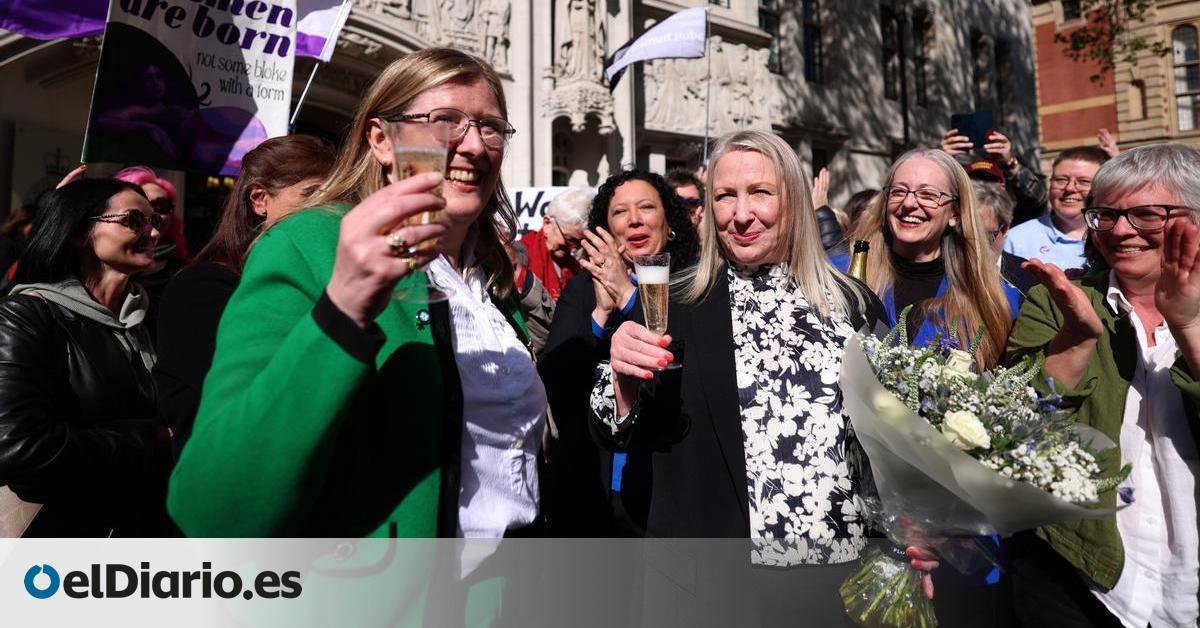
The detractors of equal rights for trans women have won their appeal before the Supreme Court of the United Kingdom on the definition of women.
Five Supreme Judges have ruled that the legal definition of ‘Woman’ in the 2010 Equality Law refers to “a biological woman and a biological sex” and does not include trans women who have gender recognition certificates.
In a defeat for the Scottish government, the decision will mean that trans women may no longer be part of the fees reserved for women in public administration councils.
The decision could have much broader repercussions, since it can lead to much greater restrictions on the rights of trans women to use services and spaces reserved for women, and arouse calls to rewrite British legislation on gender recognition.
Judge Lord Hodge has said that the Equality Law is very clear in the sense that its provisions refer to the biological sex of birth, and not to the gender sense of a person, regardless of whether or not they have a gender recognition certificate.
This affects gender policies in sports, armed forces, hospitals, exclusive charity for women and access to changing rooms and exclusive spaces for women.
“Interpreting sex as certified sex would inconsistently transferred the definitions of men and women of the Equality Law and, therefore, the characteristic protected from sex. It would create heterogeneous groups,” said the judge, summarizing the decision. “In current language, dispositions related to discrimination due to sex, and especially those related to pregnancy and motherhood and protection against risks that specifically affect women, can only be interpreted as referred to biological sex.”
“I’m desolate”
Activists for the rights of trans people have asked these people and those who support them to keep calm before the decision. “We urge people not to be carried out by panic: many statements will quickly leave that probably deliberately exaggerate the impact that this decision will have on the lives of all trans people. We will continue to inform as soon as we can. Please, take care of each other and take care of each other today,” said the Scottish Trans organization on social networks.
Ellie Gomersall, from the Verdes Scottish party, has asked the British government to change the law to strengthen full equality. “I am desolate by this judgment of the Supreme Court, which ends 20 years of understanding that trans people with a gender recognition certificate can be, almost all effects, legally recognized as their true genres.”
“These guarantees were established in 2004 following a judgment of the European Court of Human Rights, which means that today’s judgment undermines the vital human rights of my community to dignity, security and the right to be respected for who we are,” said Gomersall, who is a trans woman.
Financed by JK Rowling
Fundly supported by JK Rowling, the Scottish organization for Women Scotland said that the definition of women of the equality law is limited to the biologically born people of female sex.
The Mayan Forsater activist, who helped create the Sex Matters campaign group, who participated in the case before the Supreme Court supporting For Women Scotland, considers that the decision is correct. “We are delighted that the Supreme Court has accepted the arguments of For Women Scotland and rejected the position of the Scottish government. The court has given us the correct answer: the characteristic protected from sex – masters and female – refers to reality, not to the papers,” he argued.
Hodge, vice president of the Court, has said that the position adopted by the Scottish government and the Human Rights Commission, according to which people with gender recognition certificates are considered women, while those who did not have them no, create “two subgroups”, which would confuse organizations. A public body cannot know if a trans woman had or not that certificate because the information is private and confidential.
The court also considers that allowing trans women the same legal status as biological women could also affect the spaces and services specifically designed for lesbians, who had also suffered discrimination and historical abuse.
In a part of the sentence that could have wide implications for the political leaders of the world of sports and sports centers, he affirms that some services and places can only function properly if sex is interpreted as biological sex. ”
“These provisions include separate spaces and services for a single sex, including costumes, shelters, medical services, community accommodations, [y] They arise in the functioning of the provisions related to beneficial associations and organizations characteristic of a single sex, the equitable participation of women in sport, the functioning of the duty of equality of the public sector and the armed forces, ”he says.
Hodge has asked not to see the decision “as a triumph of one or more groups of our society at the expense of another.” He affirms that all trans people have clear legal protections under the law against discrimination and the harassment of 2010.
Kishwer Falkner, president of the Equality and Human Rights Commission, who had intervened in the case to support the position of the Scottish government, says he needs time to fully interpret the implications of the sentence.
However, the Commission congratulates that its concern had been addressed about the lack of clarity around exclusive spaces for women and lesbians. “We are pleased that this sentence addresses several of the difficulties that we highlight in our presentation before the Court, including the challenges facing those who intend to maintain spaces for a single sex, and the rights of people attracted to the same sex to form associations,” he says.
Source: www.eldiario.es

